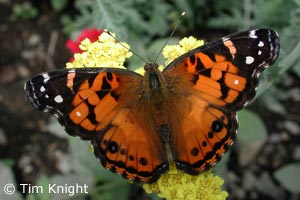

|
American Lady or American Painted Lady Vanessa virginiensis (Drury, 1773)
What they look like: The top surface of the forewings (upper two wings) are reddish orange with a black edge and small white spots. American painted ladies have two large "eye spots" on the underside of their hind wings whereas the painted lady has four smaller eye spots. The underside of the hind wings (lower two wings) are grayish brown and feature a spidery network of creamy white lines. The caterpillar are black with yellow and black bands, small yellow spots and bristly spines. 
How big are they? Wing span: 1 3/4 - 2 5/8 inches (4.5 - 6.7 cm).
How do butterflies breathe? We breathe air into our lungs. Special red blood cells pick up the oxygen, and the arteries of our circulatory system carry the oxygen to the rest of our body. Unlike people, butterflies don't have lungs. Monarchs breathe through tiny holes on the sides of their bodies called spiracles (pronouced SPEAR AH CUL). The holes open into a system of tubes (called trachea) that carry the oxygen all over their bodies. Where are they? The American Lady is found throughout the United States.Where they live: American Lady can be found in open habitats including fields, meadows, and roadsides. What they eat: The American Lady feeds on nectar from flowing plants, including dogbane, aster, goldenrod, marigold, selfheal, common milkweed, and vetch. Larva feed on pearly everlasting , plantain-leaved pussy toes, wormwood, ironweed, and burdock. Did you know?
American Lady feeding on nectar. More Information about American LadyAmerican Lady - Species Detail >> Animal silhouettes available to purchase » Photo credits: photos © 2007 Tim Knight Home | About Us | How to Participate | Biodiversity Modules | Projects | Maps | News | Resources |